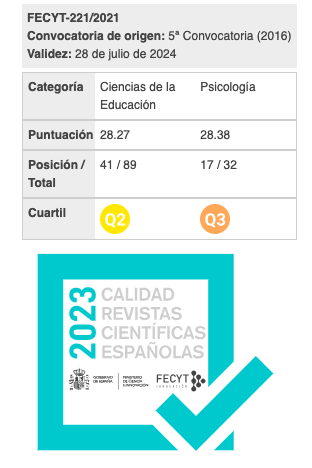Amotivation: A Key Predictor of College GPA, College Match, and First-Year Retention
Keywords:
Downloads
Abstract
Two studies examined the relationships between motivational orientation, college student success, and first-year retention. In Study 1, 523 college students completed measures of motivational orientation and student success. Results indicated that intrinsic and extrinsic motivation were positively related to college GPA, student-university match and adjustment to college. In contrast, amotivation was negatively related to these dependent variables. Study 2 examined a mediational model in which motivational orientation, most consistently amotivation, predicted lower college student GPA and poorer college match. These, in turn predicted a decrease in first-to-second-year retention among 385 first-year college students. These results suggest that colleges may wish to address amotivation among students as a way to enhance student success and retention.
Downloads
References
Anderson, J. R., Guan, Y., & Koc, Y. (2016). The academic adjustment scale: Measuring the adjustment of permanent resident or sojourner students. International Journal of Intercultural Relations, 54, 68-76. http://dx.doi.org/10.1016/jijintrel.2016.07.006
Google Scholar CrossrefBailey, T. H., & Phillips, L. J. (2016). The influence of motivation and adaptation on students’ subjective well-being, meaning in life and academic performance. Higher Education Research & Development, 35(2), 201-216. https://doi.org/10.1080/07294360.2015.1087474
Google Scholar CrossrefBaker, S. R. (2004). Intrinsic, extrinsic,and amotivational orientations: Their role in university adjustment, stress, well-being, and subsequent academic performance. Current Psychology: A Journal for Diverse Perspectives on Diverse Psychological Issues, 23(3), 189-202. https://doi.org/10.1007/s12144-004-1019-9
Google Scholar CrossrefBaker, R. W., & Siryk, B. (1984). Measuring adjustment to college. Journal of Counseling Psychology, 31(2), 179-189. https://doi.org/10.1037/0022-0167.31.2.179
Google Scholar CrossrefBowman, N. A., & Denson, N. (2014). A missing piece of the departure puzzle: Student–institution fit and intent to persist. Research in Higher Education, 55(2), 123-142. https://doi.org/10.1007/s11162-013-9320-9
Google Scholar CrossrefCopeland, K. J., & Levesque-Bristol, C. (2010). The retention dilemma: Effectively reaching the first-year university student. Journal of College Student Retention: Research, Theory and Practice, 12(4), 485-515. https://doi.org/10.2190/CS.12.4.f
Google Scholar CrossrefCredé, M., & Niehorster, S. (2012). Adjustment to college as measured by the student adaptation to college questionnaire: A quantitative review of its structure and relationships with correlates and consequences. Educational Psychology Review, 24(1), 133-165. https://doi.org/10.1007/s10648-011-9184-5
Google Scholar CrossrefDennis, J., Phinney, J. S., & Chuateco, L. I. (2005). The role of motivation, parental support, and peer support in academic success of ethnic minority first generation college students. Journal of College Student Development, 46(3), 223–236. doi:10.1353/csd.2005.0023
Google Scholar CrossrefFike, D. S., & Fike, R. (2008). Predictors of first-year student retention in the community college. Community College Review, 36(2), 68-88. https://doi.org/10.1177/0091552108320222
Google Scholar CrossrefGershenfeld, S., Ward Hood, D., & Zhan, M. (2016). The role of first-semester GPA in predicting graduation rates of underrepresented students. Journal of College Student Retention: Research, Theory, & Practice, 17(4), 469-488. doi: 10.1177/1521025115579251
Google Scholar CrossrefGilbreath, B., Kim, T., & Nichols, B. (2011). Person-environment fit and its effects on university students: A response surface methodology study. Research in Higher Education, 52(1), 47-62. https://doi.org/10.1007/s11162-010-9182-3
Google Scholar CrossrefHan, C., Farruggia, S. P., & Moss, T. P. (2017). Effects of academic mindsets on college students’ achievement and retention. Journal of College Student Development, 58(8), 1119-1134. https://doi.org/10.1353/csd.2017.0089
Google Scholar CrossrefIsacco, A., & Morse, J. Q. (2015). Male graduate students at a “Women’s college”: Examining the roles of academic motivation, support, connection, and masculinity ideology. Sex Roles, 72(7-8), 321-334. https://doi.org/10.1007/s11199-015-0447-3
Google Scholar CrossrefIvankova, N. V. (2004). Students’ persistence in the University of Nebraska-Lincoln distributed doctoral program in educational leadership in higher education: A mixed methods study. (Doctoral dissertation, University of Nebraska-Lincoln). Retrieved from: https://digitalcommons.unl.edu/dissertations/AAI3131545
Google Scholar CrossrefKamarraju, M., & Karau, S. J. (2008). Relationships between the perceived value of instructional techniques and academic motivation. Journal of Instructional Technology, 34(4), 70-82.
Google Scholar CrossrefLazowski, R. A., & Hulleman, C. S. (2016). Motivation interventions in education: A meta-analytic review. Review of Educational Research, 86 (2), 602-640. DOI: 10.3102/0034654315617832
Google Scholar CrossrefLegault, L., Green-Demers, I., & Pelletier, L. (2006). Why do high school students lack motivation in the classroom? Toward an understanding of academic amotivation and the role of social support. Journal of Educational Psychology, 98(3), 567-582. https://doi.org/10.1037/0022-0663.98.3.567
Google Scholar CrossrefLucey, K. (2018). The effect of motivation on student persistence in online higher education: A phenomenological study of how adult learners experience motivation in a web-based distance learning environment (Doctoral dissertation, Duquesne University). Retrieved from: https://dsc.duq.edu/etd/1449
Google Scholar CrossrefMorrow, J. A., & Ackermann, M. E. (2012). Intention to persist and retention of first-year students: The importance of motivation and sense of belonging. College Student Journal, 46(3), 483-491. https://link-gale-com.proxy.buffalostate.edu/apps/doc//A302464012/AONE?u=buffalostate&sid=AONE&xid=8fcbf3c
Google Scholar CrossrefNes, L. S., Evans, D. R., & Segerstrom, S. C. (2009). Optimism and college retention: Mediation by motivation, performance, and adjustment. Journal of Applied Social Psychology, 39(8), 1887-1912. https://doi.org/10.1111/j.1559-1816.2009.00508.x
Google Scholar CrossrefNowell, C. (2017). The influence of motivational orientation on the satisfaction of university students. Teaching in Higher Education, 22(7), 855-866. https://doi.org/10.1080/13562517.2017.1319811
Google Scholar CrossrefNoyens, D., Donche, V., Coertjens, L.,van Daal, T., Van Petegem (2019). The directional links between students’ academic motivation and social integration during the first year of college. European Journal of Psychology of Education, 34, 67-86. https://doi.org/10.1007/S10212-017-0365-6
Google Scholar CrossrefOtis, N., Grouzet, F. M. E., & Pelletier, L. G. (2005). Latent motivational change in an academic setting: A 3-year longitudinal study. Journal of Educational Psychology, 97(2), 170-183. https://doi.org/10.1037/0022-0663.97.2.170
Google Scholar CrossrefPeltier, G. L., Laden, R., & Matranga, M. (1999). Student persistence in college: A review of research. Journal of College Student Retention: Research, Theory & Practice, 1(4), 357-375. https://doi.org/10.2190/L4F7-4EF5-G2F1-Y8R3
Google Scholar CrossrefPintrich, P. R., & Schunk, D. H. (2002). Motivation in education: Theory, research, and applications (2nd ed.). Upper Saddle River, NJ: Merrill Prentice Hall.
Google Scholar CrossrefRatelle, C. F., Guay, F., Vallerand, R. J., Larose, S., & Senécal, C. (2007). Autonomous, controlled, and amotivated types of academic motivation: A person-oriented analysis. Journal of Educational Psychology, 99(4), 734- 746. https://doi.org/10.1037/0022-0663.99.4.734
Google Scholar CrossrefReason, R. D. (2003). Student variables that predict retention: Recent research and new developments. NASPA Journal, 40(4), 172-191. DOI: 10.2202/1949-6605.1286
Google Scholar CrossrefRobbins, S. B., Lauver, K., Le, H., Davis, D., Langley, R., & Carlstrom, A. (2004). Do psychosocial and study skill factors predict college outcomes? A meta-analysis. Psychological Bulletin, 130(2), 261–288. doi:10.1037/0033-2909.130.2.261
Google Scholar CrossrefRobinson, K. A., Lee, Y., Bovee, E. A., Perez, T., Walton, S. P., Briedis, D., & Linnenbrink-Garcia, L. (2019). Motivation in transition: Development and roles of expectancy, task values, and costs in early college engineering. Journal of Educational Psychology, 111(6), 1081-1102. http://dx.doi.org/10.1037/edu0000331
Google Scholar CrossrefRyan, R. M., & Deci, E. L. (2000). Intrinsic and extrinsic motivations: Classic definitions and new directions. Contemporary Educational Psychology, 25, 54-67. https://doi.org/10.1006/ceps.1999.1020
Google Scholar CrossrefSuhlmann, M., Sassenberg, K., Nagengast, B., & Trautwein, U. (2018). Belonging mediates effects of student-university fit on wel-being, motivation, and dropout intention. Social Psychology, 49(1), 16-28. DOI:10.1027/1864-9335/a000325
Google Scholar CrossrefVallerand, R. J., & Bissonnette, R. (1992). Intrinsic, extrinsic, and amotivational styles as predictors of behavior: A prospective study. Journal of Personality, 60(3), 599-620. https://doi.org/10.1111/j.1467-6494.1992.tb00922.x
Google Scholar CrossrefVallerand, R. J., Pelletier, L. G., Blais, M. R., Brière, N. M., Senecal, C., & Vallieres, E. F. (1992). The academic motivation scale: A measure of intrinsic, extrinsic, and amotivation in education. Educational and Psychological Measurement, 52(4), 1003-1017. https://doi.org/10.1177/0013164492052004025
Google Scholar CrossrefVallerand, R. J., Fortier, M. S., & Guay, F. (1997). Self-determination
Google Scholar Crossrefand persistence in a real-life setting: Toward a motivational model of high school dropout. Journal of Personality and Social Psychology, 72(5), 1161-1176. DOI:10.1037//0022-3514.72.5.1161
Google Scholar Crossrefvan Rooij, Els C. M., Jansen, E. P. W. A., & van de Grift, Wim J. C. M. (2018). First-year university students’ academic success: The importance of academic adjustment. European Journal of Psychology of Education, 33(4), 749-767. https://doi.org/10.1007/s10212-017-0347-8
Google Scholar CrossrefWilliams-Watson, S. (2018). Persistence among minority STEM majors: A phenomenological study. (Doctoral dissertation, University of Phoenix). Publication Number: AAT 10285589.
Google Scholar CrossrefWintre, M. G., Knoll, G. M., Pancer, S. M., Pratt, M. W., Polivy, J., Birnie-Lefcovitch, S., & Adams, G. R. (2008). The transition to university: The student-university match (SUM) questionnaire. Journal of Adolescent Research, 23(6), 745-769. https://doi.org/10.1177/0743558408325972
Google Scholar CrossrefDownloads
Published
Almetric
Dimensions
How to Cite
Issue
Section
License
Copyright (c) 2022 Jill M. Norvilitis, Howard M. Reid, Karen O'Quin

This work is licensed under a Creative Commons Attribution 4.0 International License.
All articles are published under Creative Commons copyright (CC BY). Authors hold the copyright and retain publishing rights without restrictions, but authors allow anyone to download, reuse, reprint, modify, distribute, and/or copy articles as the original source is cited.
















